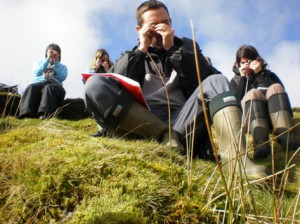Recently Dr M was struck by an article entitled “The Death of Botany” in the “Rant and Reason” section of the June 2013 edition of the magazine of the British Ecological Society. Dr Markus Eichhorn is a botanist at the University of Nottingham and he is not a happy Dr! In the article he bemoans the loss of botany degree programmes from our Universities. According to Markus, the last botany degree in the country is the one currently running at Bristol University, but this will award its last botany degrees in July this year. Botany will then be extinct as a degree programme in Britain, and this despite the continuing demand for botanical skills from employers in ecological consultancy and the conservation agencies amongst others (Institute of Ecology and Environmental Management).
In her response to Markus, Emma Sayer (Open University) notes that botany, in the form of plant science, IS still taught in universities – as the title of her article puts it: “Botany is dead, long live plant sciences!” And as Emma reminds us, the key to getting people interested in botany is to start young, at primary school or even before. Unfortunately, the National Curriculum is not very inspirational here and zoology often prevails over botany. Far easier perhaps, to focus on “minibeasts” and “creepy crawlies” than to dish out the hand lenses and get the kids excited about the form and function of leaves, twigs, flowers, seeds, mosses, lichens and so on. Not all school children will take to plants, but in my experience, it is not difficult to get many of them interested if you approach it in the right way, i.e. with knowledge, enthusiasm and fun!
And so Dr M agrees with Markus when he says we need more botany and Dr M agrees with Emma when she says the ability to communicate fascination for botany is the single best way to get children (and bigger people!) interested in it! Furthermore, fieldwork can be a real motivator here and we need more botanists from our Universities and elsewhere to take their botanical enthusiasms into the class room and into the field and to engage in botanical outreach activities with schools at all levels, our botanical future depends on it!
Contact Dr M with stories of how you first got interested in plants and those who inspired you! And with your ideas of how we can enhance botanical training in schools and beyond!

